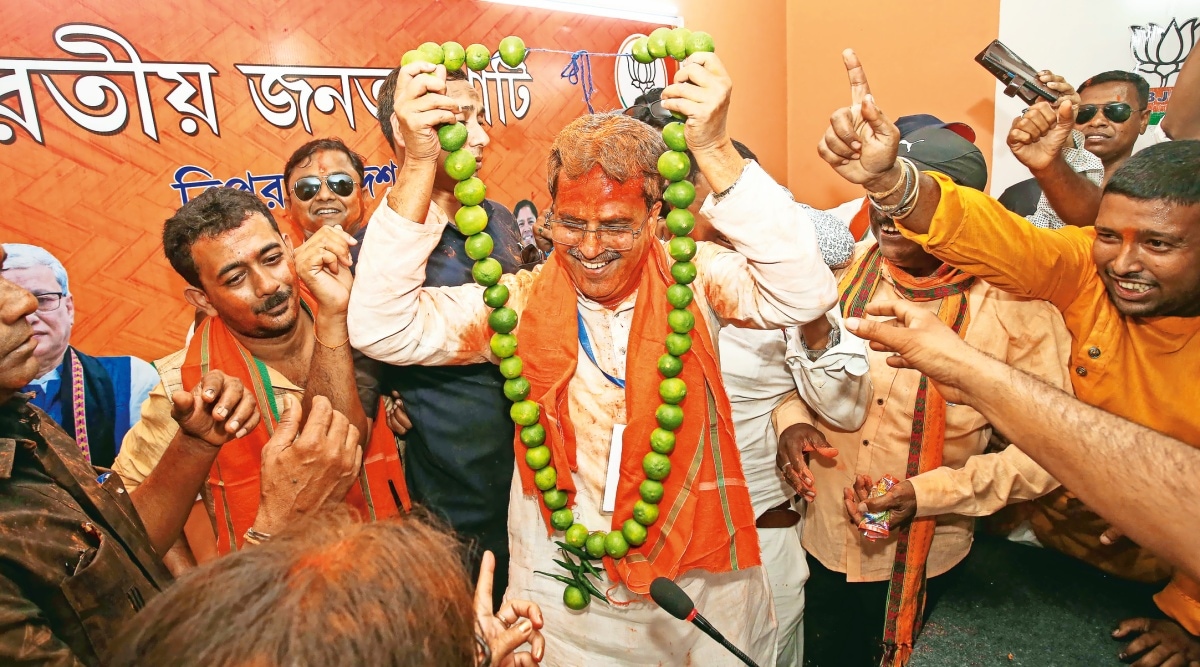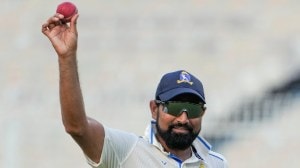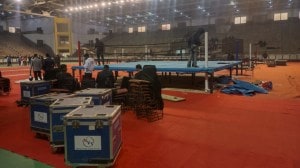It’s a win-win-win for BJP in three North-East states
Rise of TIPRA Motha as regional force; washout for Congress
 Tripura Chief Minister Manik Saha with BJP supporters in Agartala, Thursday. PTI
Tripura Chief Minister Manik Saha with BJP supporters in Agartala, Thursday. PTI The BJP on Thursday emphatically won the Tripura Assembly elections and looked poised to return to power in Meghalaya and Nagaland as a junior partner in ruling coalitions.
The party overcame a Left-Congress alliance and the TIPRA Motha, which had emerged as a force to reckon with in tribal seats, to bag 32 seats in Tripura, one more than the majority mark. It retained power in Nagaland along with senior alliance partner Nationalist Democratic Progressive Party (NDPP). In Meghalaya, the National People’s Party (NPP) emerged as the single-largest party. The NPP and the BJP ruled the state together for five years but contested the elections separately. Both said they would tie up again.
 Bharatiya Janata Party (BJP) supporters celebrate the party’s lead during the counting of votes of the Tripura Assembly elections, at Dharmanagar in North Tripura district, Thursday, March 2, 2023. (PTI Photo)
Bharatiya Janata Party (BJP) supporters celebrate the party’s lead during the counting of votes of the Tripura Assembly elections, at Dharmanagar in North Tripura district, Thursday, March 2, 2023. (PTI Photo)
The Tripura result underlined the party’s popular acceptance in the erstwhile Left bastion even though its seat tally came down from 36 five years ago to 32. But a point of concern for the ruling party will be its vote share declining from 43.59 per cent to 38.97 per cent. The BJP is also likely to be concerned about the emergence of the TIPRA Motha that won 13 seats while the ruling party’s tribal ally Indigenous People’s Front of Tripura (IPFT) won just one constituency, down from eight the previous time. The BJP’s most prominent tribal face and Deputy Chief Minister Jishnu Dev Varma lost to his TIPRA Motha rival Subodh Deb Barma in Charilam constituency by 858 votes.
The Left-Congress alliance managed 14 seats. In 2018, the CPI(M) had won 16 seats when it contested the polls on its own while the Congress failed to open its account.
On Thursday, as the counting process went on, at least 25 incidents of violence were reported from different parts of Tripura. “We don’t have any report of FIR and arrests,” said a police official.
In Meghalaya, the NPP won 26 seats. Though it is short of the magic number — 31 in this case — it is unlikely to find it hard to cobble up the numbers. With 11 constituencies in the bag, the party’s old ally United Democratic Party (UDP) has almost doubled its tally of six seats it won in 2018 and the BJP too has extended its support to the NPP.
Hours after the results, the BJP’s point person for the region and Assam CM Himanta Biswa Sarma tweeted that the party would extend support to CM Conrad Sangma. Sarma tweeted that Sangma had dialled Union Home Minister Amit Shah to seek his support in forming the new government. After that, BJP president J P Nadda advised the state unit of BJP” to support the NPP in government formation, he added.
Sangma responded, tweeting: “Thank you @BJP4Meghalaya for reaching out to the NPP and for extending your support to our party to form the Government. We will continue to work together to serve Meghalaya and its people.”
Though the two parties bitterly sparred in the run-up to the elections, the NPP is not oblivious to having the BJP as a partner at the state level, given the party’s firm control over the Centre, said sources.
The Mamata Banerjee-led Trinamool Congress (TMC), which had run a high-intensity campaign, failed to live up to expectations. The party managed to win only five seats, with its most prominent leader Mukul Sangma losing in one of the two seats he contested.
In Nagaland, the NDPP-BJP alliance increased its tally from 29 to 37 and is poised to return to power without requiring support from other parties. Neiphiu Rio, who won from his constituency Northern Angami II with a 92.78 per cent vote share, is set to return as CM for a fifth term. The increase in the alliance’s tally is largely on account of the NDPP’s growth at the expense of the Naga People’s Front (NPF) that managed to win only two seats. The BJP — which contested 20 seats as part of the seat-sharing arrangement — won 12 seats, the same as last time, and its vote share increased from 15.31 per cent to 18.8 per cent.
At a press conference in Kohima, NDPP general secretary Abu Metha hinted at the party seeking a “new approach” to government formation but did not explain what he meant. The NDPP could try to leverage its increased seat count for a greater say in government formation. In the previous tenure, the Deputy Chief Minister was the BJP’s Y Patton. But the ties between the state BJP and the NDPP saw some amount of tension over the years.
“The NDPP would like to make it very clear that the 40-20 alliance between the NDPP and the BJP is an alliance that is based on trust … As far as the formation of the next government is concerned, and looking at the experience of the past five years, we are of the view that the composition and the formation need to be looked at afresh and a new approach has to be made. The NDPP is in touch with the BJP leadership in Delhi,” said Metha.
Among the most significant outcomes is that the Nagaland Legislative Assembly is going to have women MLAs for the first time. Both the NDPP’s women candidates Hekani Jakhalu from Dimapur III and Salhoutuonuo Kruse from Western Angami won and created history.
- 01
- 02
- 03
- 04
- 05






























